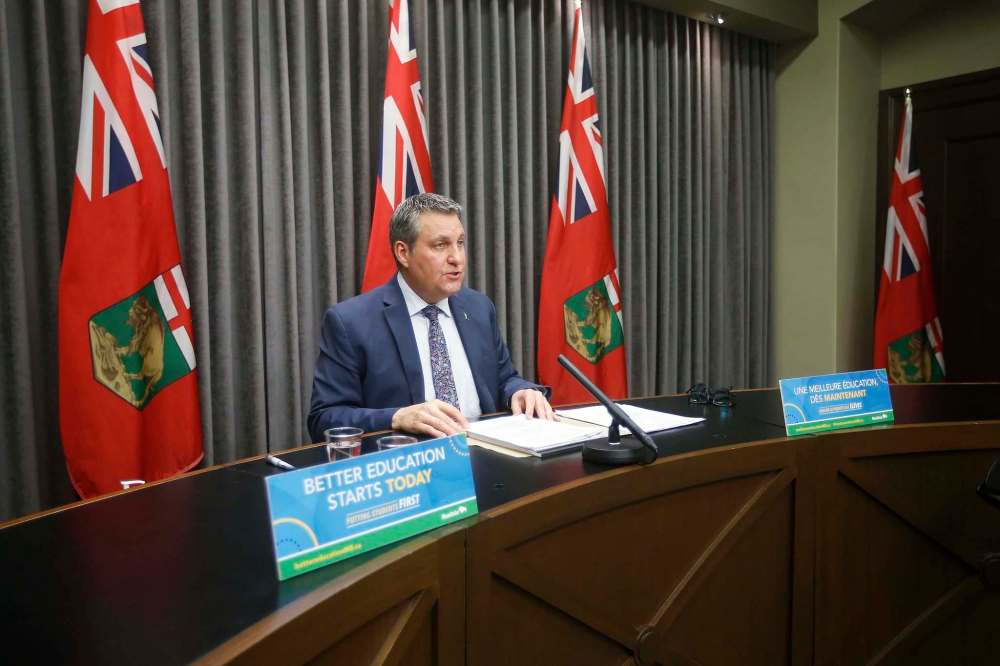School community councils a bad bargain
Advertisement
Read this article for free:
or
Already have an account? Log in here »
To continue reading, please subscribe:
Monthly Digital Subscription
$1 per week for 24 weeks*
- Enjoy unlimited reading on winnipegfreepress.com
- Read the E-Edition, our digital replica newspaper
- Access News Break, our award-winning app
- Play interactive puzzles
*Billed as $4 plus GST every four weeks. Offer only available to new and qualified returning subscribers. Cancel any time.
Read unlimited articles for free today:
or
Already have an account? Log in here »
Hey there, time traveller!
This article was published 26/03/2021 (1439 days ago), so information in it may no longer be current.
A BIG thanks to Carl DeGurse (“Expertise should guide school plan,” March 20) for highlighting some of the folly in the provincial government’s Better Education Starts Today (BEST) document and Bill 64. Parent involvement in their children’s education is essential, but its best form is interest in and knowledge about how they are doing, assistance where needed, and unwavering encouragement and support.
The school community councils described in Bill 64 are the premier’s promise to parents to finally give them a genuine participation in, and control over, their children’s education. These are empty and pernicious promises, ones that suggest education is a personal private good and individual family responsibility, that position every parent against every other parent and encourage divisive alliances in school communities, and ones which ensure most parents are left out of any meaningful decision-making, alone and isolated in advocating for their children.
These imagined councils are, at best, deception dressed up as a prize, a fabricated answer to a manufactured problem. Further, to suggest they are to be achieved through individual volunteerism suggests a duty for — and places an obligation on — parents that is impossible for many families to fulfil because of the absence of resources and authority, and guilts them when they are not up to the task.

It’s worth proclaiming again that education is everybody’s business, for everyone’s benefit. We adults — indeed, society as a whole — all have a stake in, and something to gain by, the education of every child. Ideally, every child should have a right to have their grandparents, the elders in their community, their caregivers, their neighbours and friends serve as caring, responsible advocates and teachers, in addition to their teachers at school, working with their parents to ensure them the best and most comprehensive educational opportunities.
For children, schooling is not just a matter of their families competing against all others for limited goods. And it’s not about parents using their children as weapons against a system to address their personal grievances or indulge their own private impulses. Education is not only a private good among other scarce private goods, but also a public good to be gleaned from the abundance of public goods which should be available to all in co-operation with all.
Where these ideals are lost, we find alliances that divide communities, neighbours and former friends — which is not to say that I don’t know of effective parent councils. However, all the effective parent councils I know have also welcomed non-parents and have dealt with matters bigger than their own self-interest.
Two most effective parent organizations come to mind — the parents of children for inclusive education and the parents of French immersion students — and both have been successful in lobbying boards and governments, and both have done so with the improvement of the system as well as the welfare of their children in mind.
They will tell you it was hard work and sacrifice and that they did not always agree on the way forward, but that at the end of the day their collective goal brought them together. And local coalitions turned into provincial and national agendas which invited everyone into the tent.
Volunteerism is a noble and important community activity, but education is too important to be left to the unpredictable will and resources of unpaid volunteers. The government’s proposal fails to take into account the fact many newcomer parents are reluctant to engage, for language, cultural and knowledge reasons; that many parents simply do not have the time or energy to participate at a meaningful level; and that some are just too busy making a living.
Further, whereas trustees sign oaths of office and make conflict-of-interest declarations, and volunteers in schools often undergo Child Abuse Registry and criminal-record checks, there is no mention of parents’ responsibilities beyond their own children.
Our current government, espousing the parental involvement imagined in Bill 64, is making a false promise to what is very likely a very small number of disgruntled but not disenfranchised parents. They are ostensibly granted unfettered licence to advise, but nobody needs to heed their advice, whereas under the current system if they could persuade trustees of the reasonableness and rightness of their cases, they were immediately no longer alone but had advocates with collective authority.
And under the proposed system, parents are even further removed from anyone with meaningful discretionary decision-making over curriculum, teacher evaluation, resource allocation and the like. In other words, a bad deal all around.
John R. Wiens is dean emeritus at the faculty of education, University of Manitoba. A lifelong educator, he has served as a teacher, counsellor, work education co-ordinator, principal, school superintendent and university professor.

